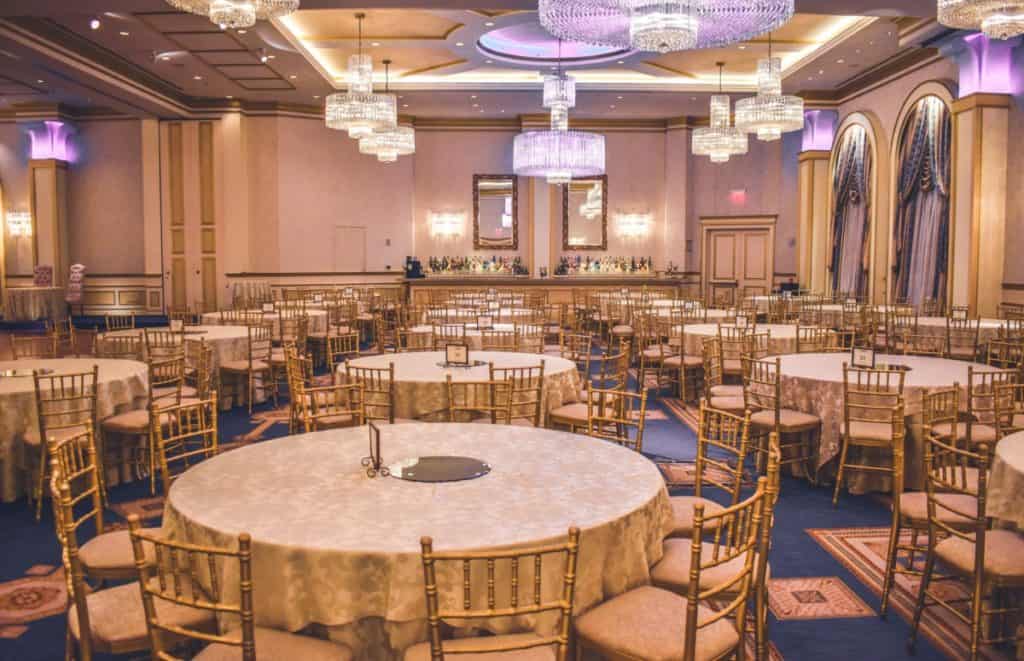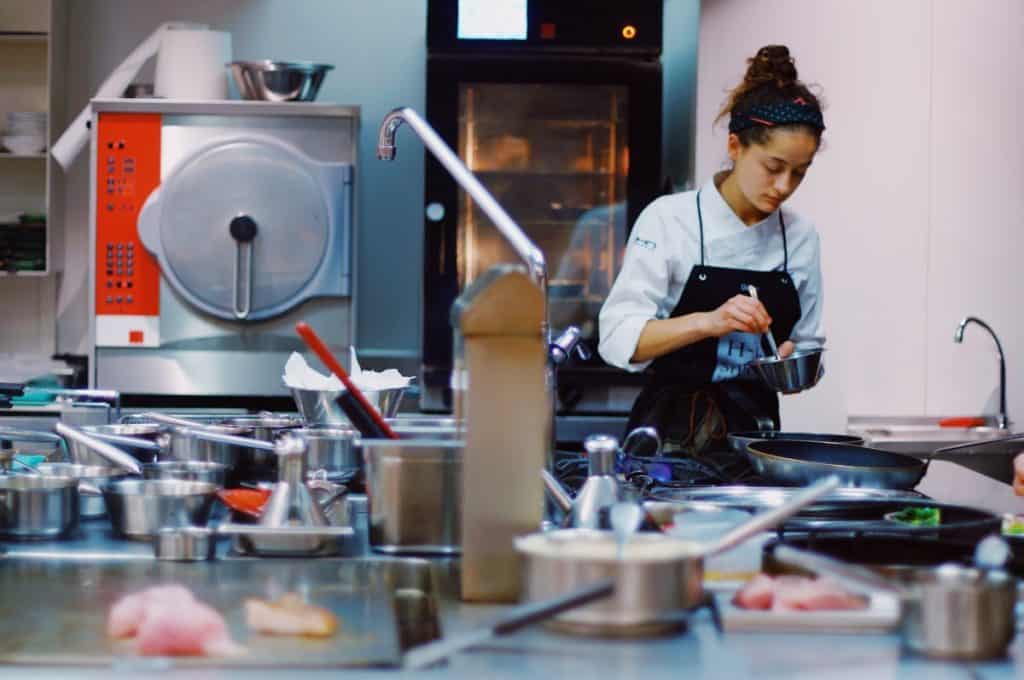
What’s it like to be a chef in a hotel? This question is common among aspiring chefs as it is one of the most popular environments to begin our career.
I completed my formal chef training in a large hotel, before moving to a smaller hotel to become a sous chef
in a large hotel, before moving to a smaller hotel to become a sous chef . This has allowed me to pass on an insider’s view on what life is actually like for hotel chefs.
. This has allowed me to pass on an insider’s view on what life is actually like for hotel chefs.
The purpose of this article is to share some of what I learned so that others looking to become a chef in a hotel can make an informed decision.
Working as a chef in a hotel provides a high level of structure and organisation that can be lacking in other smaller venues. Hotels have large teams of chefs and are very well organised to accommodate the high number of guests being served daily.
This is perhaps the main point of a life as a chef in a hotel that everything else fits into; Hotels are often large and have to cater to guests at all times of the day and night, therefor the kitchen usually has lots of staff and is set up in a structured way
How Does A Hotel Kitchen Operate?
Hotel kitchens are set up so that they can handle the large volume of dishes they need to serve as well as the many options which they give to their guests.
A hotel will often serve breakfast, lunch and dinner to guests as well as having one or more functions (such as a wedding or birthday party) on at the same time.
Hotel kitchens will are usualy structured very traditionally. There will be clearly defined sections, such as veg section, meat section etc. The pass will often be quite large so that multiple dishes can be sent out at the same time.
The hotel I worked in could accommodate around 150 guests per night and had several function rooms available for parties to hire. As you can imagine it takes some seriously defined sections and an understanding of each chef’s responsibilities to make this operation run smoothly.
There can also be several different kitchens within the same hotel. The pastry kitchen is usually separate and there can sometimes be a separate banqueting kitchen as well.
All this talk of kitchen set up is to highlight the scale of these operations. The hotel I worked in had around 20 chefs that it employed full time, as well as a handful of kitchen porters (KPs) and even a store-man.
In smaller venues the chefs will be required to take the deliveries in and monitor invoices etc. In larger hotels this is not possible; chefs stay within their defined roles .
.
What Shifts Do Hotel Chefs Work?

Chefs working in hotels work long shifts as food is available to guests at all times of the day, starting at breakfast time and going all the way through to evening meal time. Some hotels even have food available at anytime during the night!
This requires that the chefs work long hours or that there are a lot of chefs to cover the various shift requirements.
or that there are a lot of chefs to cover the various shift requirements.
The advantage of a large hotel that can employ lots of chefs, is the ability to organise the shifts so that the chefs all share the burden of busy times.
Example of chefs hotel shift pattern can be:
- Breakfast: 7am till 3pm
- Lunch: 10am till 6pm
- Evening: 2pm till Close (around 11pm)
- Split shift: 10am – 2pm & 5pm – Close
At the larger hotel I worked in, there were specific breakfast chefs. This team of three chefs where in the kitchen early in the morning and always left after the lunch time rush. This meant I never had to, in my role, serve any breakfasts.
Once I moved to the smaller hotel, as it was a much smaller team (only 5 chefs), I was required to be on the breakfast rota as well. This meant some long days starting at 7am and finishing at around 10pm (with a few hours break in between)
and finishing at around 10pm (with a few hours break in between)
The size of the hotel and the number of chefs employed has the largest bearing on shift patterns . Many kitchens will try and arrange it so all chefs have at least one working day where they get an evening off.
. Many kitchens will try and arrange it so all chefs have at least one working day where they get an evening off.
This is a lot harder to achieve in small hotels and restaurants . The requirement to cover the other chef’s days off, often mean having to work longer hours in these environments.
. The requirement to cover the other chef’s days off, often mean having to work longer hours in these environments.
What Are The Duties Of Hotel Chefs?
In large hotels, the duties that a chef have will be clearly defined. Each chef will know what is expected of them and their tasks for that day. For example, in these large brigades a chef will not have to help with the washing up if a KP is employed.
As mentioned earlier, the large hotel I was employed by had a store man and several kitchen porters. This meant even as a commis chef  I never had to help wash the dishes (unless I needed a pan urgently).
I never had to help wash the dishes (unless I needed a pan urgently).
The other advantage of KPs is that at the end of the night we would clean our knives and our work stations down and the KPs would then clean the floor, the ovens and all the units after we left.

In large brigades it makes sense to have specific people for specific jobs. Why expect chefs to clean ovens after a long shift, when they have another busy one tomorrow?
In contrast at the smaller hotel I worked in, even as a sous chef I would often have to jump in and help with the dishes, plus help mopping the floor at the end of the night, because this hotel only employed a KP on weekends.
I would often have to jump in and help with the dishes, plus help mopping the floor at the end of the night, because this hotel only employed a KP on weekends.
Smaller brigades often rely on Commis chefs to take the brunt of the additional less glamorous work . If you are a chef looking for a place where you can focus on just the cooking than larger hotels may be the best place.
. If you are a chef looking for a place where you can focus on just the cooking than larger hotels may be the best place.
However, there is a trade off and that is the variety of work.
The commis chef in the smaller hotel was asked to prep veg, fish, meat, basically anything that was needed really and where we felt he could gain experience. As it was a small team everyone chipped in with each different item.
In a large hotel (and hence a large kitchen brigade) there is a lot less freedom to do as we want. A commis placed on the veg section may not have to help wash dishes, but they are going to be focused 90% of the time on prepping and cooking the veg items.
may not have to help wash dishes, but they are going to be focused 90% of the time on prepping and cooking the veg items.
A commis chef in a large hotel gains experience of different sections by being moved to work on those sections. I myself got a little frustrated after 6 months on the veg section waiting for an opportunity to open up on one of the other sections, so I could work there and gain more experience.
A chef may come to work one morning in a large brigade and be told they need to help the pastry section for a week as they are really busy. Even if the chef doesn’t like this section, they are doing pastry for the week!
and be told they need to help the pastry section for a week as they are really busy. Even if the chef doesn’t like this section, they are doing pastry for the week!
This kind of structure is unlikely to occur in smaller hotels and restaurants, as everyone is expected to do their bit towards the menu as a whole.
What Career Progression Options Are There For Hotel Chefs?
One of the great advantages for a chef working in a hotel is the fact that they often have lots of career progression opportunities. As the kitchen brigade is larger, chefs move around more often so new opportunities open up.
For example, a large hotel may employ 10 chef de parties . For a commis looking to step up this is great; there is a high chance one of these chefs will get promoted themselves, or choose to leave, opening up a position.
. For a commis looking to step up this is great; there is a high chance one of these chefs will get promoted themselves, or choose to leave, opening up a position.
In contrast, smaller hotels and restaurants may only employ one or two chef de parties. therefor it can take a lot longer for the eager commis chef to get a promotion, as they have to wait longer for the opportunity to open up.
The fact that the hotel kitchen sections are so clearly defined also helps with career progression . I would consider it career progression every time I got moved to a different section to work.
. I would consider it career progression every time I got moved to a different section to work.
As a Commis when I got moved from larder section to fish section I saw this as a promotion (even though there was no extra money!) as the new section demonstrated my head chefs faith in me and my new elevated status within the kitchen team!
when I got moved from larder section to fish section I saw this as a promotion (even though there was no extra money!) as the new section demonstrated my head chefs faith in me and my new elevated status within the kitchen team!
Although there are no set rules about hierarchy among the sections, there are unwritten rules. Commis chefs will start on veg, and if they are good they will get moved up the section hierarchy until they end up on the meat section.

Working in a hotel also looks great on a chefs C.V . It demonstrates that we have proven ourselves in what can be a very busy and tough environment at times.
. It demonstrates that we have proven ourselves in what can be a very busy and tough environment at times.
The downside of working in a hotel in terms of career progression is that it is possible to go a little unnoticed or feel like we are unfairly stuck on a section.
I have seen examples of chefs that are not happy to be working on the section they are on, and they are either too nervous to complain to the head chef , or they have – and the head chef is refusing to move them.
, or they have – and the head chef is refusing to move them.
In these instances the career progression is like any other career path where the only real option is to move on to find new opportunities .
.
What Are The Wages Like For Hotel Chefs?
Wages for chefs that work in hotels are similar to those who work in a standalone restaurant kitchen. It is the duties and the structure that we have discussed, rather than the pay, that make the difference between which option chefs prefer.
For those interested in the average chef wages I shall link to the article I wrote here , in which I analysed average chef wages across the country at all levels.
, in which I analysed average chef wages across the country at all levels.
To sum up what working in a hotel is like for chefs:
Hotels provide a very structured environment for chefs, working in large teams with clearly defined roles and responsibilities. This is in contrast to the more laidback approach of restaurants in which everyone pitches in to help where required.
I hope this has been useful, please take some time to look around the site which contains many articles all things chef career related!
